One!Take News Observer
Black Music Month: California Celebrates History and Heroes
McKenzie Jackson California Black Media
Kenny Vance has a talent for creating vivid musical imagery.
If you ask the 79-year-old about his musical upbringing in 1950s Brooklyn, New York, Vance will describe wandering through the borough as a young man and listening to other young people sing harmonious tunes with no instruments from the neighborhood’s stoops. He will mention how groups would string together melodic lines in competitions with each other.
Vance notes how these melodic groups in the ‘50s and ‘60s, composed of African Americans, sang their way from their neighborhood stoops and other local spots in cities such as Chicago, New York, and Los Angeles to small recording studios. These vocalists, whose Rhythm-andBlues singing style is known as doo-wop, would release a song or two and sometimes never be heard from again.
With his documentary “Heart & Soul: A Love Story,” Vance, a musician, actor, and film director, puts the musical talents of “unsung doo-whop heroes” like Frankie Lymon and the Teenagers, the Dubs, Little Anthony and the Imperials, and the Chantels in the limelight again. The film will be screened at the GRAMMY Museum in Los Angles on June 8 at 7 p.m. The two-hour showing in the museum’s 200-seat theater is part of its celebration of Black Music Appreciation Month this June.
The screening of Heart & Soul: A Love Story,” is just one-way individuals, businesses and organizations are commemorating Black Music Month throughout the state.
In Alameda County, The Black Music Month Festival will take place on June 17 from 2 p.m. to 6 p.m. at Love Center Ministries in Oakland.
Kristen Welker Making History as

First Black ‘Meet The Press’ Moderator
By Stacy M. Brown NNPA Newswire Senior National Correspondent
NBC’s long-standing political panel show, “Meet the Press,” will experience a history-making change as Chuck Todd, the current moderator, announces his departure after nearly a decade. Stepping into his shoes will be Kristen Welker, the first Black host of the renowned program. During his announcement, Todd, 51, stated that he wanted to put his family first and avoid letting work consume him, citing examples of friends and family who regretted not doing the same. While the exact date of his final show remains uncertain, Todd assured viewers that this summer would mark his departure. Reflecting on his tenure, he expressed concern about the current historical moment but took pride in the high standards maintained by the show. He emphasized their refusal to entertain propagandists, reiterating that the network and program would continue to uphold these principles.
Welker, a former chief White House correspondent, has been with NBC News in Washington since 2011.
Since 2020, she has served as Todd’s primary substitute.
Welker, a former chief White House correspondent, has been with NBC News in Washington since 2011.
Also, her performance as the moderator for Joe Biden and Donald Trump’s final debate during the 2020 presidential campaign garnered widespread praise.
Media experts have hailed Welker’s skillful and incisive
Fort Bragg Drops Confederate Namesake for Fort Liberty, Part of US Army Base Rebranding
questioning of lawmakers during political interviews as a masterclass in the field.
In a memo announcing her promotion, Rebecca Blumenstein, NBC News President of Editorial, praised Welker’s abilities.
Welker, 46, will now assume the significant responsibility of leading the program during what promises to be another contentious presidential election cycle.
Since 1947, when Martha Rountree hosted the program, “Meet the Press” has remained a mainstay on Sunday mornings.
The program experienced peak years during Tim Russert’s tenure from 1991 until his untimely passing in 2008. Subsequently, Tom Brokaw temporarily filled in before David Gregory assumed the role until Todd’s appointment.
With Welker’s ascension to the moderator position, she becomes the first Black host in the show’s history and the first woman since Rountree’s departure in 1953.
Industry officials said the milestone marks a significant step forward in diversifying “Meet the Press” and underscores the importance of representation in the media.
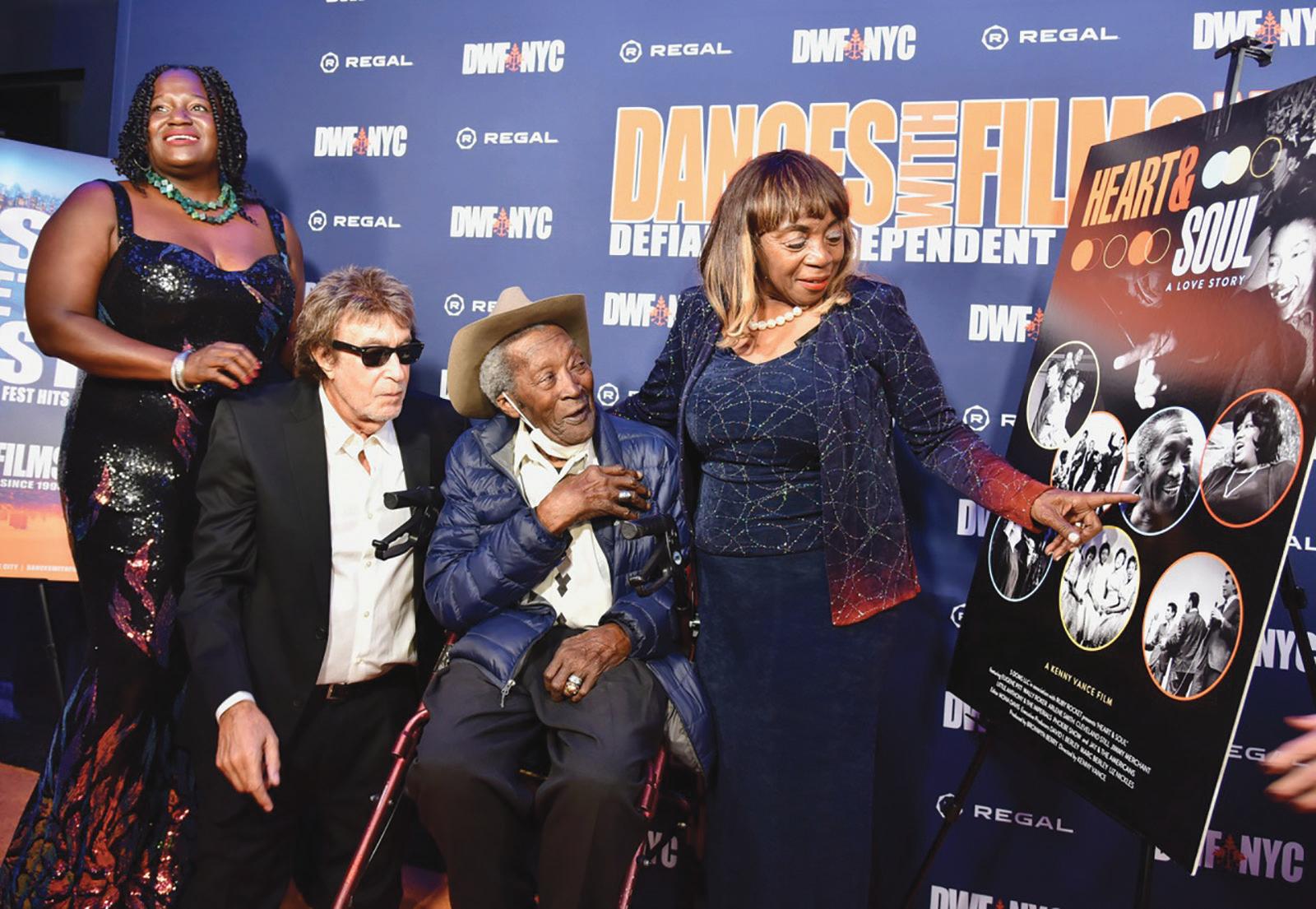

With Welker’s appointment, NBC News pledged a fresh perspective and renewed energy as the program hopes to continue its legacy of providing insightful political analysis and interviews with key figures.
Homeowners Struggle with Housing Costs Study Finds Over One Quarter of US
By Stacy M. BrownNNPA Newswire Senior National Correspondent
A recent study conducted by the Chamber of Commerce, a product research company specializing in real estate, revealed that more than 25% of homeowners in the United States are burdened by housing costs, spending over 30% of their income on their homes.
The study utilized data from the U.S. Census Bureau, analyzing monthly housing costs and median household income in the 170 most populated cities nationwide.
The findings indicate that 27.4% of all homeowners are considered “cost-burdened.”
Miami, Los Angeles, and New York City are leading the list of cities with a significant number of financially strained homeowners, where more than four in 10 feel stretched beyond their means due to housing expenses. Interestingly, all but one of the top 10 cities for cost-burdened homeowners are in California or Florida.
In the District of Columbia, 26.3% of homeowners also grapple with the weight of housing costs.
The rise in mortgage interest rates is one factor that contributes to the financial strain homeowners experience.
At the pandemic’s beginning, rates hit historic lows but surged past 7% in 2022, reaching the highest levels since 2002.
While rates have cooled slightly since early 2023, new
homeowners still face significantly higher monthly mortgage payments compared to those who locked in lower rates. Combined with skyrocketing inflation and stagnant wages, Americans now owe trillions more than before the pandemic.
The higher housing costs are eating into savings, spending, and emergency funds.
The impact of rising housing costs is not limited to homeowners alone. Renters also bear the brunt of this trend, as escalating housing expenses increase rental rates.
It means that renters and homeowners feel financially strapped by growing housing costs.
The study sheds light on the long-standing personal finance guideline known as the “30 percent” rule.
This rule advises individuals to ensure that their housing expenses, including rent or mortgage payments, property taxes, and utilities, do not exceed 30% of their monthly income.
However, with the current housing affordability challenges, many individuals need help to abide by this rule.
The study also reveals a concerning trend.
From 2015 to 2019, the percentage of financially burdened homeowners in the United States decreased annually, dropping from 29.4% in 2015 to 26.5% in 2019.
However, the pandemic has begun to reverse these gains, with cities like Los Angeles and New York experiencing an upward trend in cash-strapped homeowners.
In Los Angeles, almost half of homeowners are considered
“house poor,” despite a four-percentage-point decrease between 2015 and 2019. Similarly, in New York City, the percentage of house-poor homeowners increased to over 45% in 2021, up from 41.3% in 2019. On the other hand, Miami bucked the trend, as the percentage of house-poor homeowners dropped by two and a half points to 44.6% in 2021.
The Federal Reserve, faced with the uphill battle of fighting inflation, has raised interest rates monthly since March 2022.
Although the Fed does not directly set mortgage rates, its actions often influence home loan rates.
However, there is now a glimmer of hope on the horizon as the central bank signals a potential break from the consecutive rate increases that have taken place over the past year.
As the housing affordability crisis deepens, policymakers and stakeholders must address the mounting challenges homeowners and renters face.
“It is imperative to find sustainable solutions that alleviate the burden of housing costs and promote financial stability for all Americans,” said District of Columbia Realtor Piper Alford.
“It’s never ideal to spend more than 30 percent of your income on housing,” Alford insisted. “But today’s market, prices, inflation, and greed has caused many to find basic living unaffordable.”
America
By HANNAH SCHOENBAUM Associated Press/Report forFORT LIBERTY, N.C. (AP) - Fort Bragg shed its Confederate namesake Friday to become Fort Liberty in a ceremony some veterans said was a small but important step in making the U.S. Army more welcoming to current and prospective Black service members.
The change was part of a broad Department of Defense initiative, motivated by the 2020 George Floyd protests, to rename military installations that had been named after confederate soldiers.
The Black Lives Matter demonstrations that erupted nationwide after Floyd’s killing by a white police officer, coupled with ongoing efforts to remove Confederate monuments, turned the spotlight on the Army installations. A naming commission created by Congress visited the bases and met with members of the surrounding communities for input.
While other bases are being renamed for Black soldiers, U.S. presidents and trailblazing women, the North Carolina military installation is the only one not renamed after a person. Retired U.S. Army Brig. Gen. Ty Seidule said at a commission meeting last year that the new name was chosen because “liberty remains the greatest American value.”
The cost to rename Fort Bragg - one of the largest military installations in the world by population - will total about $6.37 million, according to a commission report. “The name changes, the mission does not change,” base spokesperson Cheryle Rivas said Friday morning before the ceremony. Fort Polk in Louisiana will be the next installation to change its name June 13 to Fort Johnson, in honor of Sgt. William Henry Johnson.
The North Carolina base was originally named in 1918 for Gen. Braxton Bragg, a Confederate general from Warrenton, North Carolina, who was known for owning slaves and losing key Civil War battles that contributed to the Confederacy’s downfall.
Several military bases were named after Confederate soldiers during World War I and World War II as part of a “demonstration of reconciliation” with white southerners amid a broader effort to rally the nation to fight as one, said Nina Silber, a historian at Boston University.
“It was kind of a gesture of, ‘Yes, we acknowledge your patriotism,’ which is kind of absurd to acknowledge the patriotism of people who rebelled against a country,” she said.
The original naming process involved members of local communities, although Black residents were left out of the conversations. Bases were named after soldiers born or raised nearby, no matter how effectively they performed their duties. Bragg is widely regarded among historians as a poor leader who did not have the respect of his troops, Silber said.
For Isiah James, senior policy officer at the Black Veterans Project, the base renamings are a “long overdue” change he hopes will lead to more substantial improvements for Black service members.
“America should not have vestiges of slavery and secessionism and celebrate them, “ he said. “We should not laud them and hold them up and venerate them to where every time a Black soldier goes onto the base, they get the message that this base Bragg is named after someone who wanted to keep you as human property.”
The secretary of defense is required by law to implement the naming commission’s proposed changes by Jan. 1, 2024.
White Man Who Pulled Gun Gets Probation for MLK Day Confrontation with Black Teens
MIAMI (AP) - A white man was sentenced to probation in South Florida Tuesday for pulling a gun and yelling racial slurs in a traffic confrontation with a group of Black teenagers protesting housing inequality on Martin Luther King Jr. Day in 2019.
As part of a deal with with prosecutors, Mark Bartlett, 55, pleaded guilty to a hate crime and aggravated assault and also agreed not to possess a firearm for a decade, the Miami Herald reported. Bartlett must also perform 300 hours of community service and take anger management classes and racial sensitivity training. Bartlett could have faced decades in prison, but Miami-Dade County Judge Alberto Milian granted Bartlett a withhold of adjudication, which means Bartlett will avoid a formal conviction.
Bartlett had previously claimed he was acting in self-defense during the confrontation, but following a 2021 hearing Milian ruled that Bartlett did not act reasonably in getting out of his SUV and pulling a pistol on the teenage protesters who had stopped traffic near the Brickell Bridge in downtown Miami. Bartlett had testified that he was being held hostage as his SUV was stuck in traffic and that he was goaded into repeatedly using a slur. He acknowledged the slur is a derogatory term for a Black person but denied that it was racist.
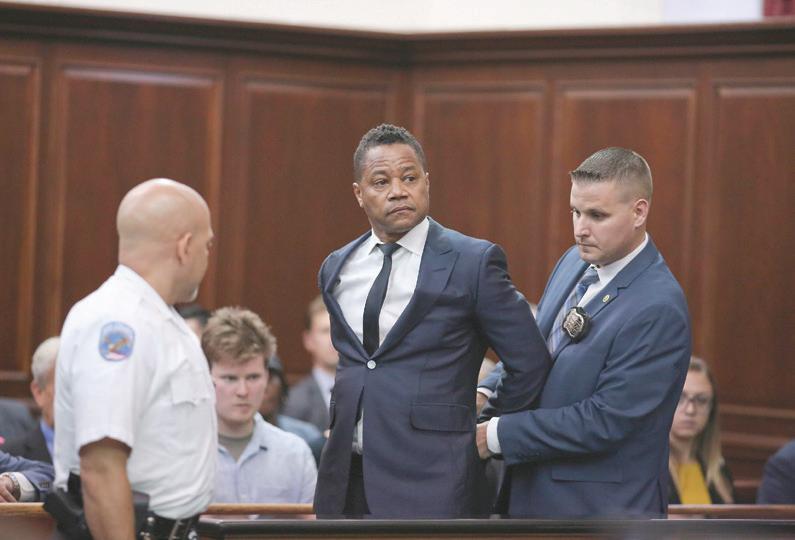
As a condition of his plea agreement, Bartlett apologized in court Tuesday and admitted that his words were hateful.
Cellphone video taken by bystanders shows Bartlett carrying a handgun and yelling racial slurs at the teenagers on bicycles blocking traffic in downtown Miami.
The protest involved potential loss of affordable housing in the impoverished Liberty City neighborhood of Miami. It coincided with a much larger event, “Wheels Up, Guns Down,” that was timed to coincide with Martin Luther King Jr. Day and involved mostly young African-American men riding motorcycles and allterrain vehicles in traffic, popping wheelies and riding while standing on the seats.
Historically Black University Discrimination Lawsuit Moves Forward in Florida

For 33 years, from 1987 to 2020, this discrepancy amounted to approximately $1.3 billion, according to the complaint. Despite both universities being the only public land-grant colleges in the state, FAMU claims that it has been unfairly disadvantaged.
By Stacy M. BrownNNPA Newswire Senior National Correspondent
A class-action lawsuit accusing the state of Florida of discriminating against a historically Black university while favoring its predominantly white counterpart has been allowed to proceed by Judge Robert L. Hinkle of the Northern District of Florida. The lawsuit, filed in September, marks the first court test in this case, and although the judge dismissed the state’s request to dismiss the suit, he did request revisions. Six Florida A&M University (FAMU) students filed the lawsuit, alleging that the University of Florida receives a higher state appropriation per student than FAMU. For 33 years, from 1987 to 2020, this discrepancy amounted to approximately $1.3 billion, according to the complaint. Despite both universities being the only public landgrant colleges in the state, FAMU claims that it has been
unfairly disadvantaged. According to a 2022 study by Forbes, FAMU received $2,600 less in funding per student in 2020 than the University of Florida, which supports FAMU’s claim. Additionally, Forbes highlighted that FAMU relies more heavily on state funding than its white counterpart. Last year, The New York Times reported on the challenges faced by FAMU’s football players, including inadequate practice equipment and understaffed support for students. One of the accusations made in the lawsuit is that the state allows Florida State University, also located in Tallahassee, to duplicate over 40 programs offered by FAMU. This duplication makes it difficult for FAMU to attract prospective students interested in their fields of study. Civil rights attorney Josh Dubin, representing the plaintiffs, emphasized the failure to provide FAMU with equitable funding in proportion to traditionally white institutions. He argued that this lack of support hampers
FAMU’s ability to establish its identity and maintain its facilities adequately. Dubin stated in an interview, “We’re talking about segregating African American students from white students. This obviously has racism at its core.” The plaintiffs demand that the state commit to equity in its support of historically Black colleges and universities (HBCUs) and seek injunctive relief under various laws, including Title VI of the 1964 Civil Rights Act, which prohibits racial discrimination in federally funded programs. While not dismissing the case, Judge Hinkle has requested attorneys to amend the lawsuit for clarity. The defendants named in the lawsuit are the state of Florida, the board of governors and chancellor of the State University System Ray Rodrigues, the State Board of Education and its commissioner Manny Diaz Jr., and Republican Governor Ron DeSantis. Spokespeople for the Board of Governors and the State Board of Education have
declined to comment on the ongoing litigation. According to the organization’s statement, the hearing coincided with the NAACP issuing a travel advisory for Florida due to Governor DeSantis’s “aggressive attempts to erase Black history and to restrict diversity, equity, and inclusion programs” in the state’s schools. The DeSantis administration previously blocked offering an Advanced Placement course in African American studies in Florida high schools earlier this year. Historically Black colleges and universities were established to provide Black students with opportunities for higher education and upward mobility during segregation. However, these institutions have faced numerous challenges, including decades of underfunding, and housing issues, contributing to their current crises and resource limitations.
Bakersfield
News Observer
Adjudicated
Minnesota Establishes Office to Address Missing and Murdered Black Women and Girls
By Stacy M. Brown NNPA Newswire Senior National CorrespondentIn a significant step toward addressing the distressing issue of missing Black women, Minnesota has taken a groundbreaking initiative by establishing the nation’s first-ever Office of Missing and Murdered Black Women and Girls.
The state’s decision to confront this profoundly troubling trend comes as a response to the countless untold and unsolved stories that have plagued the community for far too long.
State officials established a task force in 2021 under the direction of Lakisha Lee, whose sister Brittany Clardy vanished and died ten years prior.

President: Ellen Coley CEO: Jon Coley
Publisher/ Editor: James Luckey Jr. Operations Manager: James Luckey
Credo-The Black Press believes that America can best lead the world away from racial and national antagonisms when it accounts to every person, regardless of race, color, or creed full human and legal rights. Hating no person, fearing no person, the Black Press strives to help every person in the firm belief that all are hurt as long as any one is held back.
The Observer Group Newspapers reserves the right to publish views an opinions that may not necessarily reflect those of the staff and management and are solely the product of the responsible individuals who submit commentaries published in these newspapers. Letters, articles and comments appearing in the Observer Newspapers reflect the opinions of the contributor and do not constitute the opinion or endorsement by The Observer Newspapers or its staff. The Observer Group Newspapers assumes no responsibility for photographs, articles, letters, press releases and unsolicited materials. Decisions as to the editing and publishing of materials are at the discretion of the Publisher and Editors. All rights are reserved on materials accepted for publication unless otherwise specified.
Bakersfield News Observer Los Angeles News Observer The Valley’s News Observer
1219 20th St. Bakersfield, Ca 93301 Mailing
Address P.O. Box 2341 Bakersfield, CA 93303
Phone (661) 324-9466 Fax (661) 324-9472
Emails and general info: observernews@gmail. com, Advertising: observeradvertising@gmail. com Available online: www.ognsc.com
Clardy, only 18 at the time, had gone missing, and authorities found her lifeless body in the trunk of her car.
Lee recalled the anguish her family experienced and the frustration with law enforcement’s initial response.
“We knew something was wrong right away,” she expressed in an interview with NPR.
“But after they asked us her age and demographics, they assumed she had simply run away with her boyfriend. We knew our sister better than anyone. We were the experts on our own family.”
Motivated by the desire to ensure that other cases of missing Black women do not suffer the same fate as Clardy’s, Lee and her task force embarked on a journey that culminated in the creation of this pioneering office.
Supported by Democratic State Representative Ruth Richardson and a team of dedicated volunteers, the task force
presented a report in 2022 that shed light on the alarming reality Black women face in Minnesota.
Despite constituting only 7% of the state’s population, Black women accounted for 40% of its domestic violence victims.
The task force’s findings reverberated beyond Minnesota’s borders, inspiring neighboring states such as Illinois and Wisconsin to adopt similar initiatives.
However, Minnesota has taken the lead by establishing the first Office of Missing and Murdered Black Women and Girls in the entire country.
To tackle this pressing issue head-on, the Minnesota Legislature has committed a substantial budget of nearly $2.5 million over the next two years.
A significant portion of these funds, approximately $300,000 annually, will be dedicated to community-based organization grants.Furthermore, the state allocated $948,000 to establish and operate the Office of Missing and Murdered Black Women and Girls, ensuring its effectiveness and reach.
An additional $50,000 annually will assist with public awareness campaigns to educate the public about the office and its mission.
Lee fervently hopes that these collective efforts will bring about lasting change.
“We can work towards a community intervention model that truly serves all families for generations, making the office unnecessary in the long run,” she emphasized. “Together, we can put an end to this epidemic.”
Black Music Month: California Celebrates History and Heroes
Performers such as The Dynamic Miss Faye Carol & Her Trio, Bobi Cespedes, Stephanie Crawford, Netta Brielle, and the Glen Pearson Trio featuring Derick Hughes, Bernard Anderson, and Rico Pabon will take the stage.
Throughout June, Disneyland is also honoring the history of Black music by featuring three bands performing hits by Black artists from various decades on the Hollywood Backlot stage at the park.
Black Music Appreciation Month celebrates African American musical influences that make up an essential portion of America’s cultural heritage. Established by President Jimmy Carter in 1979, it recognizes the history and rich musical traditions that gave rise to genres such as barbershop, blues, funk, gospel, hip-hop, jazz, and swing music.
Every president since Carter has continued the tradition, including President Joe Biden. Biden proclaimed June as Black Music Month in a May 31 statement.
“Today, the creative ways that Black music tells stories of trial and triumph in American life continue to move us all to understand the common struggles of humanity,”
Biden’s proclamation reads. “This month, we celebrate the songs and artists that challenge us to think critically, stand up to injustice, and believe in ourselves. We recommit to expanding the promise of dignity and opportunity for all Americans. And we revel in the sounds, spirit, and soul of some of the very best music ever created.”
Back in Los Angeles, GRAMMY Museum Chief Curator & VP of Curatorial Affairs Jasen Emmons said “Heart & Soul” shows the musical innovation in the Black community.
“If you didn’t have access to instruments — this ability to get together and create vocal harmonies as a group — it doesn’t require access to certain things,” he stated. “You can do it anywhere — stoops, subways, street corners. I think of hip-hop having similar innovation — despite the resources — to create something original and enduring.”
The film is a collection of video recordings shot by Vance over a decade with artists he befriended and worked with. The oral histories’ documentary features first-hand accounts of what it was like for young Black and Latino
musicians to go into an entertainment industry that was unsure of how to manage the new artists’ sound.
Vance, prone to breaking out in melody himself while discussing the musicians featured in “Heart & Soul,” said the doo-wop performers — whose 50s’ and 60s’ heyday influenced later genres like rock ‘n’ roll and soul — oftentimes get no credit for their impact on American music culture.
Brand architect and television personality Erika Pittman will emcee the Los Angeles screening. Hip-hop icon Christopher “Kid” Reid, one half of the duo Kid ‘n Play, will deliver an opening monologue. Entertainment journalist Brande Victorian will lead an after-screening conversation with Vance. Emmons hopes viewers gain a deep understanding of doo-wop music.
“There is an audience that deeply loves doo-wop and when the songs come on the radio, they evoke a lot of emotion in people,” he noted.
The state’s decision to confront this profoundly troubling trend comes as a response to the countless untold and unsolved stories that have plagued the community for far too long.
THE ERIC ANDRE SHOW
How the Most ‘Incompetent Talk Show
Host of All Time’ Keeps Getting Guests
 By KRYSTA FAURIA
Associated Press
By KRYSTA FAURIA
Associated Press
LOS ANGELES (AP) - "The Eric Andre Show" is ostensibly not a series that lends itself to longevity. Its titular star, who plays a version of himself and satirizes talk shows by putting unsuspecting celebrity guests through hellish interviews, has become considerably more famous since the series first aired over a decade ago.

But through a combination of disguises and an artfully deceptive booking team, Andre is gearing up for the premiere of the sixth season this Sunday on Adult Swim, boasting a star-studded list of guests in the episodes to come, including Lil Nas X, Natasha Lyonne and Jon Hamm.
"We used to worry about, like, 'Oh, am I going to be more recognizable?'" Andre said of his increasing fame, eventually realizing it doesn't take much to fool people. "I disguised myself a lot this season. I rocked the ponytail and the glasses, and I would wear COVID masks sometimes."
There is a kind of poetic, albeit sadistic, justice that comes from watching the cult show make the most envied in society the butt of its joke, including high- profile names over the years like Seth Rogen, Demi Lovato, Dennis Rodman and Judy Greer.
A few - including Lauren Conrad and T.I. - have walked off in disgust or indignation. But that number is surprisingly low given that Andre often keeps guests in emotional and physical discomfort for an hour or more, only to edit interviews down to mere minutes.
"I'm in character," Andre explained. "I'm trying to just be the most absurd and incompetent talk show host of all time."
Once celebrities are brought on the "talk show," their
egos are subjected to all kinds of abasements, both through Andre's absurd line of questioning and through physical pranks - some unbeknownst to viewers and only revealed later by former guests.
"It's a break from the kind of fictitious propaganda of traditional press, I think," he theorized, mocking actors and the stories they share on actual late- night talk shows.
"They're like, 'Hey, you know, on set, George Clooney played a prank on me,' or whatever. They have some anecdote from set. It feels - people can smell it's a little inauthentic."
Part of what makes the pranks so impressive is Andre's ability to pull them off, even when guests become visibly angry and sometimes threatening toward him.

"I'm calculating every next step," the comedian said of what goes through his mind during the interviews. "I don't want to laugh. I've done so much work and so much prep has gone into bringing that prank into production that I don't want to be the one that blows it."
Despite the fact that even he is not particularly comfortable with it, Andre's antics often at some point involve nudity - either by him or the show's infamous "naked PA" - a move that frequently pushes guests over the edge.
"You gotta do what it takes," Andre, ever the showman, explained. "There's not a lot of things that are like completely jaw-dropping shocking. So, nudity is just kind of like a guaranteed reaction."
Although he denies outright lying to get people on the show, he concedes he and the bookers frequently "bend the truth," and then come up with elaborate schemes to prevent publicists from seeing the torturous pranks they unknowingly walked their clients into.
"We don't let publicists into where the stage is and we'll show them like fake monitor feeds and stuff," he explained, adding they are sometimes sent on a "wild goose chase" when they get an inkling of what is going on.
He recalled having actor Robin Givens on the show last season, saying her publicist at one point demanded the interview be stopped. In an effort to buy Andre more time, the show's assistant director allegedly led the publicist down a series of wrong turns throughout the building.
"Outside, back in, pretending he didn't know where we were," Andre said, bursting into laughter.
His stunts might lead some to believe that Andre is a simple clown. But the comedian, who studied upright bass at the Berklee College of Music, will often give glimpses into the more learned corners of his brain, inexplicably dropping commentary on things like capitalism or militarism amid the chaos of his interviews.
"What can I say, man? Patriotism is the conviction that your country is superior to all others because you were born in it," he says abruptly in one interview with NBA player Blake Griffin last season.
The fact that Andre keeps coming back for more has been of late a pleasant surprise for fans, given that he at times seems ready to move on from the show, as well as his recent involvement in other projects.
He fittingly stars in a sort of spoof on reality competition shows called "The Prank Panel" alongside his "Jackass Forever" co-star Johnny Knoxville and Gabourey Sidibe.
And in 2021, after years of delays and back and forth with different studios, Netflix finally released "Bad Trip," a narrative film with pranks on real people that stars Andre, Tiffany Haddish and Lil Rel Howery.
"I was going to end the show after five seasons and then I didn't make any money on 'Bad Trip,'" he laughed, though he acknowledged his motivations for coming back to "The Eric Andre Show" were not just financial.
"Why permanently close the door on a show where I have full creative freedom?" he said, hinting that door is still open for more after this season.
Despite Andre's claim that "Bad Trip" didn't make him any money, the film's success once it hit Netflix seems to have engendered future opportunities for the comedian, though he is reluctant to say more about what those projects are.
"It's not even my corporate overlords. It's superstition. So, I'll tell you when the time is right,'' he teased.
3 Women Who Say Cuba Gooding Jr. Sexually Abused Them Can Testify at Sex Assault Trial, Judge Rules
By LARRY NEUMEISTERAssociated Press NEW YORK (AP) – Three women who claim Cuba Gooding Jr. sexually abused them - including one upset she never got her day in court when Gooding resolved criminal charges without trial or jail - can testify at a federal civil trial next week to support a woman's claim that the actor raped her in 2013, a judge ruled Friday.
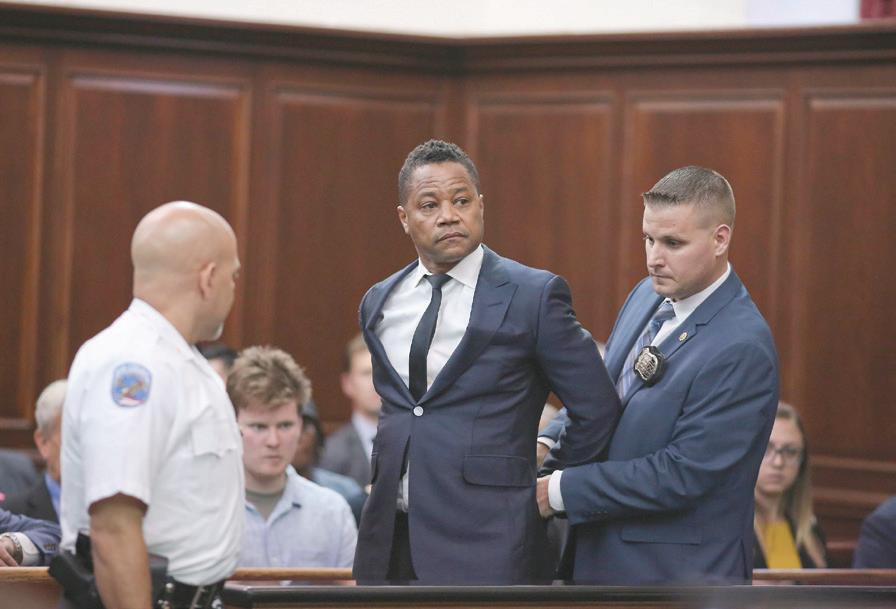
Judge Paul A. Crotty said the allegations by the women were relevant for a jury deciding if the Oscar-winning "Jerry Maguire" star raped a woman in a Manhattan hotel room after they met at a bar. He also ruled in a separate order that the plaintiff, identified only as Jane Doe in the lawsuit seeking $6 million in damages, must reveal her name at trial.
He said the claims by the three women who can testify "are sufficiently similar" to the claims at stake in the trial because "all involve sudden sexual assaults or attempted sexual assaults" connected to Gooding and stemmed from the presence of the women and Gooding in social settings such as festivals, bars, nightclubs and restaurants.
Lawyers for Gooding, a #MeToo defendant in multiple courts, have said Gooding had consensual sex with the woman who accused him of rape after they met in the VIP lounge of a Greenwich Village restaurant and she joined him at a nearby hotel bar, agreeing to proceed to his hotel room so the actor could change his clothing. The lawyers did not respond to an
email request for comment Friday.
The three women include Kelsey Harbert, who said in tears after Gooding pleaded guilty last year that never getting her day in court was "more disappointing than words can say."
Harbert told police Gooding fondled her without her consent at Magic Hour Rooftop Bar & Lounge near Times Square in 2019.
The Associated Press does not typically identify people who say they are victims of sexual assault unless they grant permission, as Harbert has done.
The judge disallowed the testimony of a fourth woman on the grounds that her proposed testimony that Gooding groped her breast without her consent in 2011 was so similar to Harbert's expected testimony that it would be "needlessly cumulative" and would increase the chance of improper bias.
The trial is scheduled to start Tuesday.
Gooding, a star in films including "Boyz n the Hood" and "Radio,'' was permitted to plead guilty in April 2022 to a misdemeanor, admitting that he forcibly kissed a worker at a New York nightclub in 2018.
After staying out of trouble and completing six months of alcohol and behavioral counseling, Gooding was permitted to withdraw his guilty plea and instead pleaded guilty to a noncriminal harassment violation, eliminating his criminal record and preventing further penalties.
The deal was criticized by some of at least 30 women who prosecutors say have made sexual misconduct allegations against him, many citing encounters at New York City nightspots that resulted in groping, unwanted kissing and other inappropriate behavior.
Attorney Gloria Allred, who represents the plaintiff, declined to comment except to say that her client will be going forward with the trial on Tuesday.
Prospects for a settlement, which sometimes occur in civil cases on the eve of trial, seemed dim at a pretrial conference Thursday as trial attorneys were in such sharp disagreement that the judge warned in ruling Friday that "counsel will act with the utmost courtesy and professionalism towards one another and the Court going forward.''
Black Caucus Members’ Bills Protecting Black Children, Union Workers Advance
State Sen. Steven Bradford (D-Gardena) SB 673 legislation would increase awareness and resources to locate missing Black youth and Black women. Bradford is shown here at a California Reparations Task Force meeting in Oakland, Calif., on May 6, 2023. (CBM photo by Antonio Ray Harvey)
Antonio Ray Harvey California Black Media
Pro-public service legislation introduced by Assemblymember Tina McKinnor’s (D-Inglewood), Assembly Bill (AB) 1, moved closer to becoming law when it was passed by the Assembly with a 66-3 vote in late last Month.
It is now under consideration in the Senate.
If passed by the Legislature and signed by Gov. Newsom, the bill will permit California legislative staff to unionize and collectively bargain for wages, benefits and working conditions, regardless of their political affiliation.
“Legislative staff aren’t looking for special treatment. They are looking for the same dignity and respect afforded to all represented workers,” said McKinnor in a statement after her colleagues voted to advance the legislation.
“To the staff in our district offices and Capitol offices - including our dedicated committee staff - that honorably serve the people of the State of California every day, know this: We see you and we respect you,” McKinnor continued. “With AB 1, we are taking action to make sure that current and future legislative staff, regardless of their member’s political affiliation, are afforded a safe, equitable and fair opportunity to build a noble career in public service.” McKinnor, a former legislative employee herself, said at the
Women In California Legislature” speakers series on March 8 that she was an original signer of the “We Said Enough” letter in 2017.
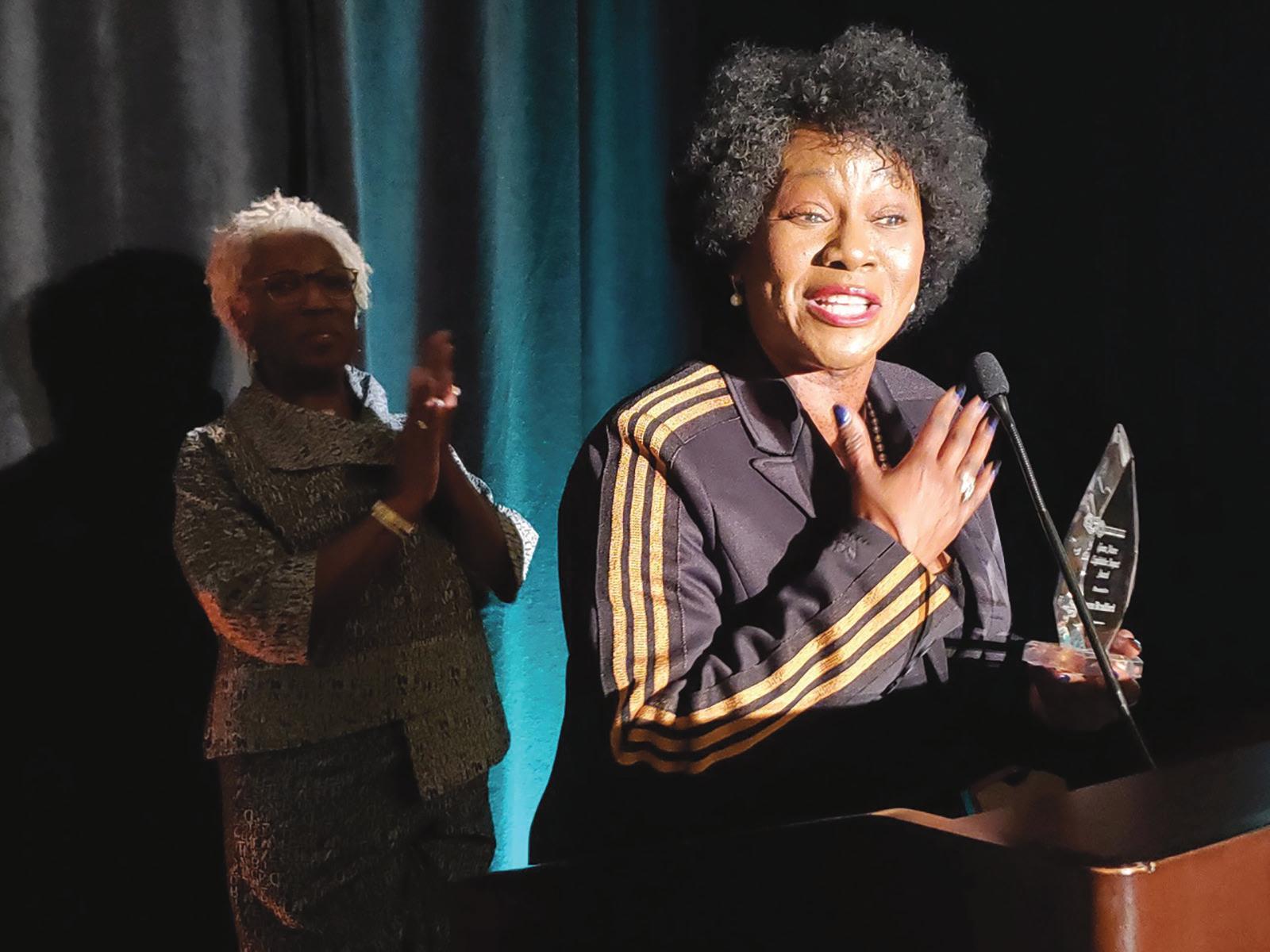
The correspondence led to the “Me Too” movement to address workplace sexual harassment, retaliation and intimidation within the California Legislature. Mary Virginia Watson, chief of staff for Assemblymember Liz Ortega (D-Hayward), supports AB 1. Watson has been a campaign director, campaign, director, and political organizer.
“Congrats to #CALeg staff! I was proud to speak in favor of #AB1 in (the) policy committee, and as a chief of staff, I 100% support Leg staff’s right to unionize. A union would improve recruitment and retention and help the legislature better serve Californians!,” Watson tweeted.
If AB 1 is approved, it will take effect on July 1, 2024.
Another bill, dubbed the “Ebony Alert” bill, would help locate missing Black youth and Black women in California also made it out of the Senate last week with a 39-0 vote.
Senate Bill (SB) 673, authored by Sen. Steven Bradford (D-Inglewood), establishes a notification system to address the issue of missing Black children and young Black women in California who do not receive enough attention.
“The Ebony Alert would ensure that resources and attention are given so we can bring home missing Black women and Black children in the same way we would search for any missing child and missing person,” Bradford, Vice Chair of the
California Legislative Black Caucus (CLBC), stated in March.
The Black and Missing Foundation Inc. (BAMFI), reports that 38% of missing children in the U.S. are Black, despite Black people making up 14% of the population. Black children are disproportionately classified as “runaways” in comparison to their white counterparts who are classified as “missing.” Therefore, when Black children are reported missing, law enforcement does not always treat those cases with urgency or issue Amber Alerts.
The AMBER moniker – which stands for America’s Missing: Broadcast Emergency Response – was created as a legacy to nineyear-old Amber Hagerman, who was kidnapped and murdered while riding her bicycle in Arlington, Texas.
“When someone who is missing is incorrectly listed as a runaway, they basically vanish a second time. They vanish from the police detectives’ workload. They vanish from the headlines. In many ways, no one even knows they are missing. How can we
find someone and bring them home safely when no one is really looking for them,” Bradford said.
Bradford’s Ebony Alert bill is inspired by a similar bill, the Feather Alert, introduced by Assemblymember James Ramos (D-San Bernardino), the only Native American serving in the California Assembly. The Feather Alert law, which took effect in January, assists law enforcement to quickly notify the public when Native American Californians are reported missing. Black women and girls face a higher risk of being harmed and trafficked. According to a report by the Congressional Black Caucus Foundation on human trafficking incidents in the U.S., 40% of sex trafficking victims were identified as Black women.
Despite Pushback From Franchise Owners, Assembly Passes Fast Food Worker Bill
Antonio Ray Harvey California Black Media
Last week, fast-foods franchise owners and other opponents of Assembly Bill (AB) 1228 suffered a setback when the State Assembly approved a bill that would grant national franchise corporations more control over their businesses.
The bill has been forwarded to the Senate for review.
The Fast Food Franchisor Responsibility Act, authored by Assembly Chris Holden (D-Pasadena), passed off the Assembly floor with 42 votes in favor of the legislation while 22 members of the Assembly voted against the bill.
“We’ve heard fast-food workers experience of wage theft, violence at work, sexual harassment and assaults, denied sick days, intense heat, poor work-place safety practices, and retaliation for speaking out,” said Holden before his colleagues voted on the bill.
“Well, this does not imply that all fast-food franchisees mistreat their workers. It is clear that we must ensure that our fast-food workers are able to thrive in their workplace and in their communities,” he added.
According to the Employment Policies Institute, which reviewed wage claims from the California Department of Industrial Relations for the period of 2017 – 2022, the quickservice restaurant industry accounted for 1.6% of wage claims despite representing 3.2% of California’s workforce.. Holden, Mia Bonta (D-Alameda), Kevin McCarty (D-Sacramento), Issac Bryan (D-Los Angeles), Mike Gipson (D-Carson), Reggie Jones Sawyer (D-Los Angeles), (D-Los Angeles), Tina McKinnor (D-Inglewood), and Akilah Weber (D-La Mesa) – all members of the California Legislature Black Caucus – voted in favor of AB 1228.
Some opponents of AB 1228 say the bill was introduced to send a message to the fast-food industry.
“What is the bill really about? I looked at this bill closely in the Judiciary Committee and I didn’t see evidence that there are more labor violations in the fastfood industry than in other sectors,” said Assemblymember Bill Essayi (R-Corona) before the vote.
“Well, I think what this bill is about is retaliation. It’s retaliation against an industry that dares to stand up to this body and to pass or qualify a referendum to undo a really bad law that’s going to drive up food costs for every Americans,” he continued. In the weeks leading up to the vote, a coalition of franchise fast food restaurant owners across California launched a voter-education campaign against AB 1228.
The Stop the Attack on Local Restaurants was buttressed by a public outreach with 30-second ads. The ads featured diverse California franchise restaurant owners sharing their concerns about ways AB 1228 would infringe on their rights to manage their small businesses.

“AB 1228 would destroy franchise businesses like mine,” said Mat. A., a Black restaurant owner in Lake Elsinore who appears in one of the ads the group released.
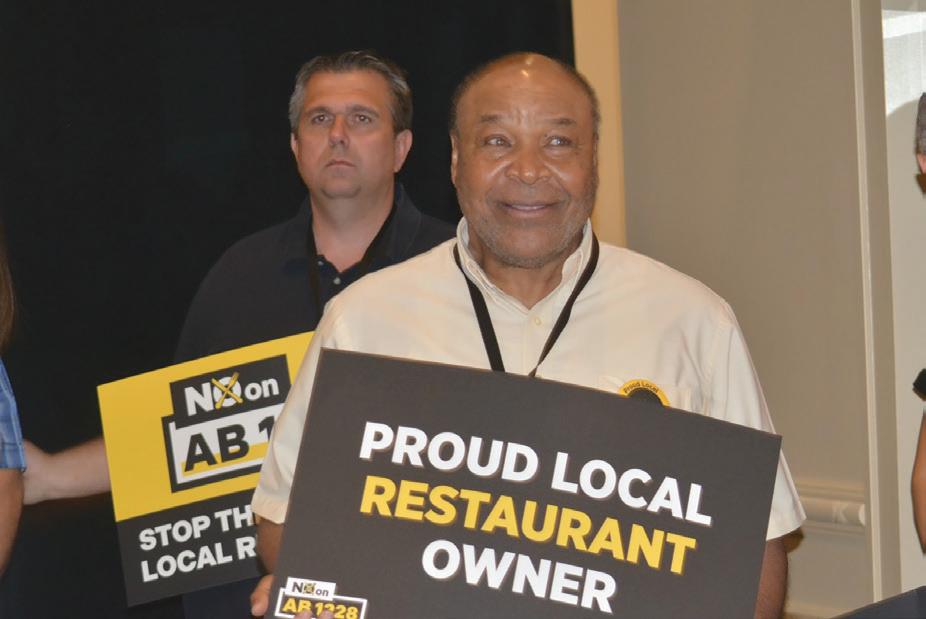
Last month, over 100 local franchise restaurant owners rallied at the State Capitol in Sacramento to push back against AB 1228. They argue that the bill would cut off one of the best pathways to business ownership for minority entrepreneurs. The owners were joined by social justice advocates, other small businesses owners, ethnic business leaders, and several representatives from restaurant brands and trade associations.
“It would destroy our business. We’ve worked hard to build a legacy for our family to take care of our employees and take care of our customers,” businessman Percy Johnson told California Black Media at the Citizen Hotel in downtown Sacramento, where the franchisees held a news conference.
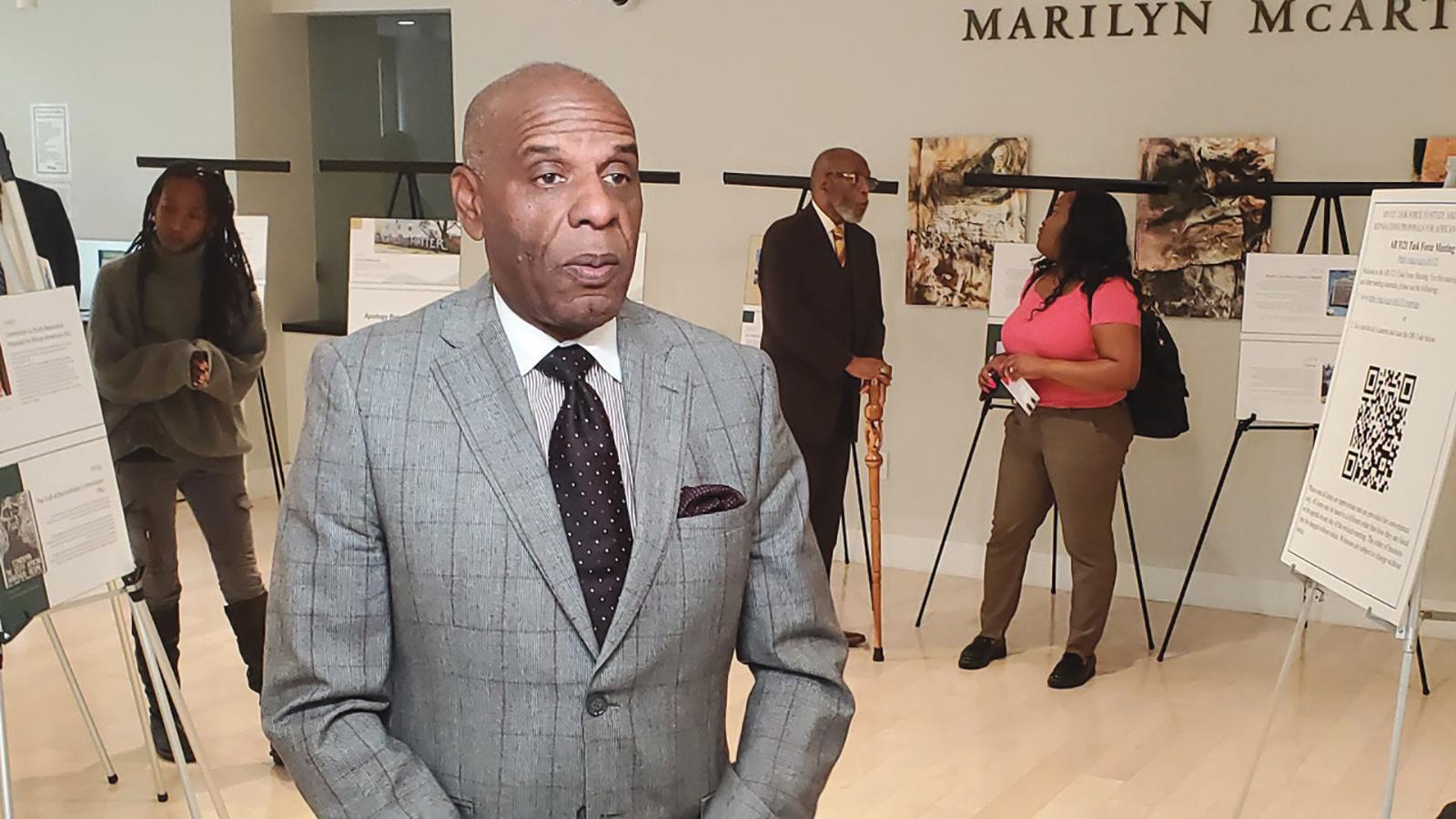
Johnson owns eight McDonald’s restaurants in the Sacramento area that he operates with members of his family. He’s been a franchisee for approximately 26 years and his restaurants employ at least 300 people.
“Make no mistake about it, these are our customers, and these are our employees. These are not corporate employees or corporate customers,” Johnson added.
In addition to running a successful chain of restaurants, Johnson said he participates in community activities, gives back money to support humanitarian causes, and supports other small businesses.
AB 1228, authored by Chris Holden (D-Pasadena), would void any agreement between a franchise restaurant and its corporate parent that waives liability for violations against the franchisor.
Making the case for AB 1228, Holden explains that some franchisees violate employee rights at a far higher rate than establishments owned and operated by the franchisor.
“I believe many franchisees want to do right by the people that work for them but may not see it as possible under their franchisor’s terms and conditions. This can help to provide some relief while protecting employees and businesses,” said Holden in a statement.
Owners argue that without specialized agreements between franchisors and franchisees, they would be
constrained by broad corporate restrictions which often force them to choose between profitability and following standards.
However, supporters of AB 1228 say franchisees would have the opportunity to file action against their corporate parents if abiding by the franchisor’s terms infringes on their ability to comply with employment laws.

Jai Coward and his wife Kayla Coward are the owners of a Dog Haus franchise in Santa Clara they opened in 2010. Their franchise has grown to 55 locations, including eight restaurants in Texas. When the Cowards were first granted a franchise license, they immediately started planning to expand – acting on a dream they had since college.
Now, the Cowards are hoping that AB 1228 will not kill their dreams.
“The whole reason why we went into business is to do business for ourselves. I am here doing this for us and our community. I don’t want to be a manager. I can go get a corporate job,” Jai Coward said. “Honestly, for us, I think we’re looking outside of California (if AB 1228 becomes law). Our brand, Dog Haus, we’re franchising nationwide now. For us, it might be us looking at other states and other opportunities as well.” California is home to more than 15,000 franchised quick-service restaurants in every region of the state. The overwhelming majority of franchised restaurants are locally-run and operated by small business owners – many of whom are people of color, women, immigrants and veterans.
According to a study by Oxford Economics, nearly 50% of McDonald’s owners and operators in California are people of color. Marisol Sanchez and her family own three McDonald’s franchises that she says are employee-friendly, profitable and connected to the community. Some of Sanchez’s employees have worked for the family for 30 years.
The business helps employees achieve the American dream, she said. “We provide our employees with more than just a paycheck. We’ve helped dozens of our crew members pursue citizenship, become homeowners with down payment assistance, and apply for college for tuition assistance,” Sanchez said. “It’s unimaginable why anyone would want to take the decisions out of my hands and instead put outof-state corporations in charge of my business and crew members.”
Black News Publishers Watchful of Legislative Process as Online News Payment Bill Advances
Edward Henderson
California Black Media
Black news publishers in California are watching lawmakers closely, anticipating that they will include provisions in a projournalism bill that would benefit their businesses.
On June 2, the California Assembly passed Assembly Bill (AB) 886 with a vote of 46-6.
The bill would mandate that social media platforms such as Twitter, Facebook and Google to pay a “journalism usage fee” to news organizations for sharing their content.
Assemblymember Buffy Hicks (D-Oakland) said she authored the bill with the goal of supporting California’s local news media outlets including ethnic media and small news publishers throughout the state.
“Free press is in our constitution, and it is at risk right now. That is what this bill is about,” Wicks told the Assembly. “Publishers deserve to be paid a journalism usage fee relative to how much their content is used on these platforms.”
According to the text of the bill, newspaper advertising has decreased by 66% over the past 10 years, and newsroom staff have declined 44%.
“Given the important role of ethnic media, it is critical to advance state policy that ensures their publishers are justly compensated for the content they create and distribute,” the bill’s language asserts.

AB 886, also known as the California Journalism Preservation Act, would require outlets receiving funds to use 70% of it on journalists and support staff. The bill was co-sponsored by the California News Publishers Association (CNPA), and the California Labor Federation (CLF).
“When local newspapers shutter, civic engagement goes down, corruption goes up, and the ability to combat disinformation erodes further,” CNPA wrote in a statement of support for the bill.
“Like all workers, journalists’ labor produces value. News
workers win their fair share of it through collective bargaining with employers, as protected by the National Labor Relations Act. But, if that value is unfairly captured by third-party tech websites instead of the news publishers that employ journalists, these workers cannot bargain for pay that reflects their actual economic
productivity. Meanwhile, newsroom jobs keep disappearing,” wrote CFL’s Mitch Steiger in a press release. AB 886 also references a document written by the African American journalist and abolitionist Samuel Cornish in 1827. It highlighted the need for African Americans to have their own
platform to express their grievances, advocate for their rights, and challenge racial inequality.
“We Wish to Plead Our Own Cause,” Cornish wrote and Wicks references in the bill language.
The bill language goes on to state, “This call to action spurred the establishment of numerous Black-owned newspapers and publications, solidifying the role of the Black press as a powerful tool for empowerment and social change, and laid the groundwork in our country for other ethnic media to plead their own cause.”
The Bill has faced opposition from multiple organizations such as the National Newspaper Publishers Association (NNPA), the California Chamber of Commerce, CalMatters and Facebook’s parent company Meta. According to Meta, news accounts for less than 3% of the content appearing on most Facebook users’ feeds. They also state that the media’s struggles were not in direct correlation with the growth of social media platforms.
“If the Journalism Preservation Act passes, we will be forced to remove news from Facebook and Instagram rather than pay into a slush fund that primarily benefits big, out-of-state media companies under the guise of aiding California publishers,” Meta said in a statement.
An analysis conducted by the tech industry-funded group Chamber of Progress shows that the biggest beneficiaries of the proposed law would be news outlets such as Fox News, the New York Post and Newsmax, all of which have faced accusations of spreading misinformation in the past.
According to the study, these outlets would receive four times more in revenue than major California news organizations, 151 times more than Latino news outlets in the state, 643 times more than newspapers located in the state’s worst news deserts and 844 times as much as California Black news outlets.
The bill will now be considered by the state Senate.
AFRICON 2023 is Back in Los Angeles for Another Year
By Philtrina FarquharsonContributing
WriterAFRICON 2023, now in its third year, culminated in an exhilarating weekend that united thought leaders, entrepreneurs, creators, and activists from the Black diaspora, igniting a sense of pride and inspiring connections to ancestral roots.
As one of the largest celebrations of the Black diaspora in the country, AFRICON took center stage in downtown Los Angeles, captivating attendees with a whirlwind of panels, parties, and immersive experiences. Amplify Africa, Inc.’s CEO and Co-Founder, Damilare Kujembola, expressed the mission behind the event, stating, “Our goal is to showcase the richness of Africa and educate attendees about the untapped potential and opportunities that Africa holds.”
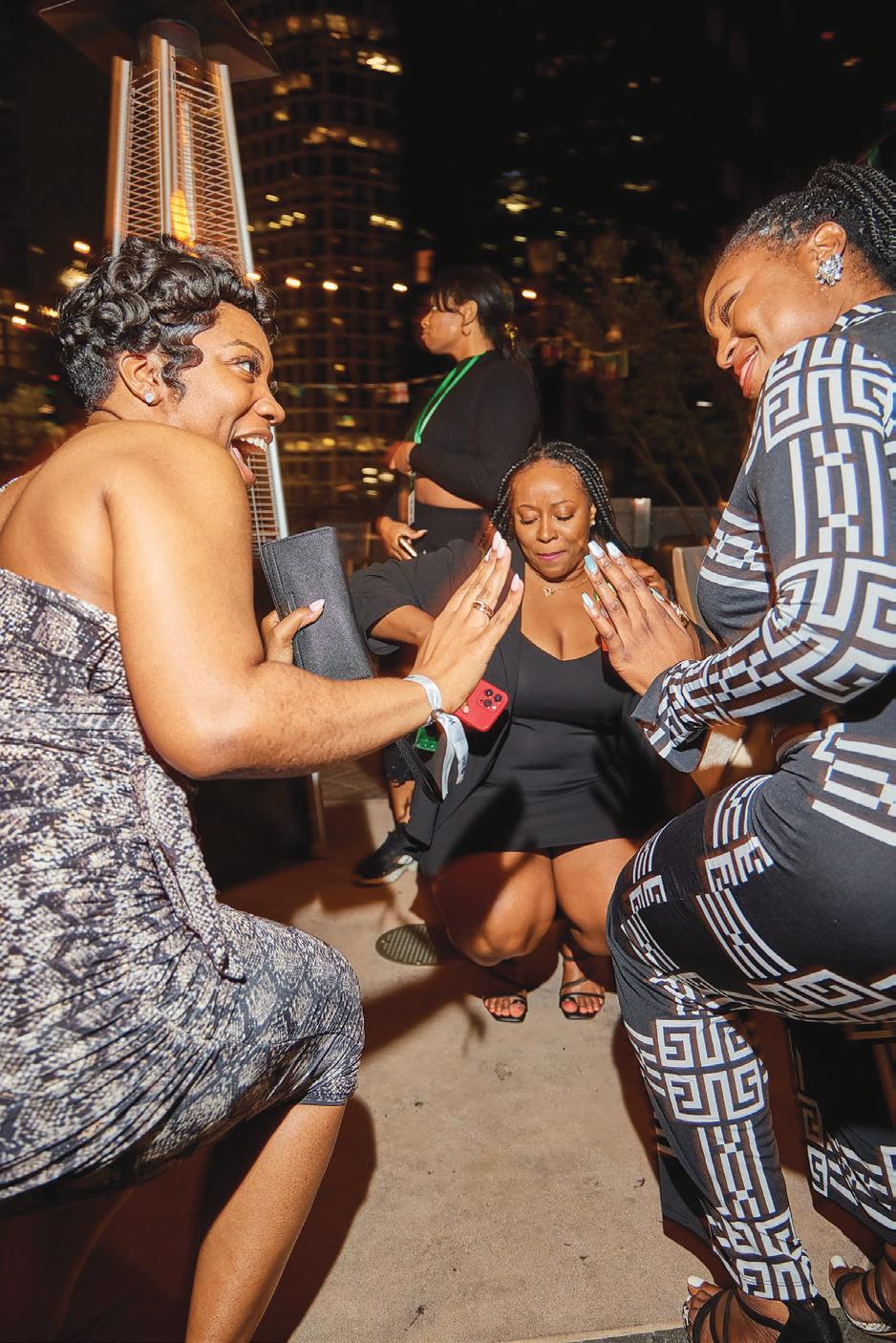

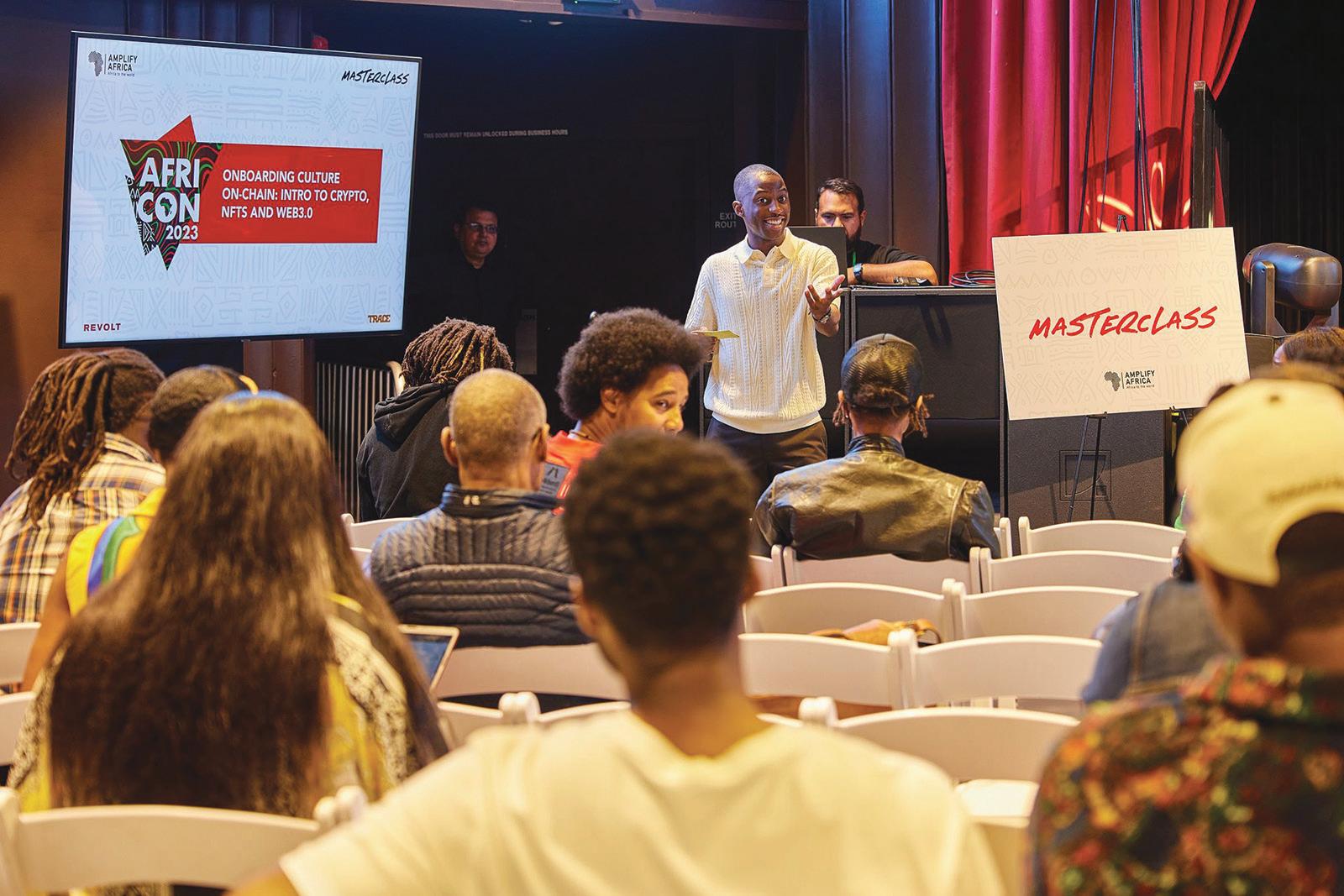
The conference kicked off on Thursday, coinciding with the 60th anniversary of Africa Day—a day that commemorates the establishment of the African Union. Over the course of four days, AFRICON hosted a myriad of thought-provoking discussions, delving into topics that resonated deeply with the Black community. Engaging panelists explored crucial issues such as generational wealth, empowerment of Black creatives, and the future of Africa. Attendees had the opportunity to learn from thought leaders who not only looked like them but also shared similar experiences. The conference also addressed pressing matters, including economic empowerment, healthcare disparities, criminal justice reform, and representation in media.
One of the standout moments of the weekend was the highly anticipated Afro Ball Gala. An event created to entail a fusion of fashion, philanthropy, and celebration. This elegant event recognized individuals who had made significant contributions in amplifying Africa through their professional and creative endeavors. Among this year’s honorees were Vic Mensa, the multi-talented musician, activist, and entrepreneur; Jackie Aina, a beauty mogul and influential figure; and Tolulope Erogbogbo, a visionary Founder and Executive Chef of ILÉ Bistro, a recent Culver City hotspot.
In a fitting conclusion to the successful weekend, AFRICON’s COO, Timi Adeyeba, and CEO Dami Kujembola received a certificate of recognition from Los Angeles’ very own Karen Bass. The certificate acknowledged their tireless efforts and dedication in raising awareness of African culture and heritage within the city, as well as their role in celebrating Africa Day.
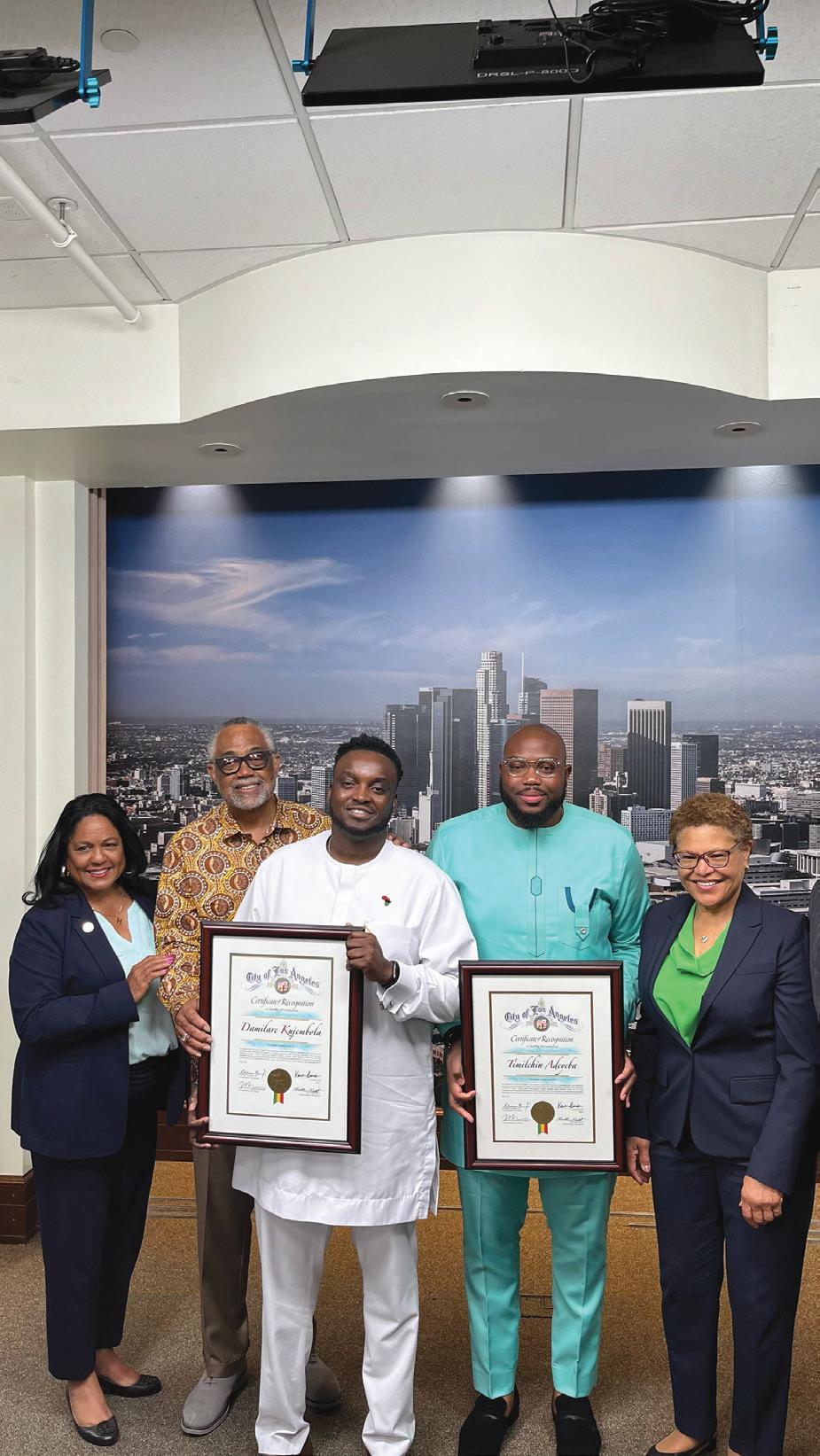
AFRICON 2023 proved to be a transformative experience for attendees, leaving an indelible mark on the Black community in Los Angeles and beyond. Through vibrant discussions, empowering panels, and memorable celebrations, the event fostered a deep sense of pride, connectedness, and renewed inspiration. As AFRICON continues to grow in influence and reach, it serves as a catalyst for empowering Black individuals, building bridges within the diaspora, and forging a brighter future that embraces Africa’s potential.
As the curtains closed on AFRICON 2023, the echoes of its impact reverberate throughout the city, leaving a lasting legacy of unity, celebration, and empowerment. This remarkable event reminded us all of the strength and richness of the Black diaspora and highlighted the invaluable contributions made by individuals dedicated to amplifying the voices and stories of Africa.
For more information about AFRICON and its future endeavors, please visit https://www.amplifyafrica.org/
California Black Media Political Playback: News You Might Have Missed
Tanu Henry and Edward Henderson
California Black Media
Your roundup of stories you might have missed last week.
Assembly Democrats Release Spending Plan Ahead of 202324 Budget Vote
On May 24, California Assembly Democrats released a budget proposal which aims to close the state’s projected $31.5-billion-dollar deficit.
In the plan, the lawmakers are calling on Gov. Gavin Newsom to close five more state prisons by 2027. This is an increase of three more prison closures than the number proposed in the Governor’s budget plan released in January.
In the May budget revisions, Newsom declared that despite the closures, California “remains committed to meeting the needs of staff and the incarcerated populations while right-sizing California’s prison system to reflect the needs of the state as the prison population declines.”
The Legislature is facing a rapidly approaching June 15 deadline to approve the state’s 2023-24 budget, and Gov. Newsom must sign off on it before the new fiscal year starts on July 1.
LA Mayor, City Council Celebrate Africa Day
On May 30, Los Angeles Mayor Karen Bass joined city council leaders to observe Africa Day. The celebration commemorates the establishment of the African Union (called the Organization of African Unity at the time).
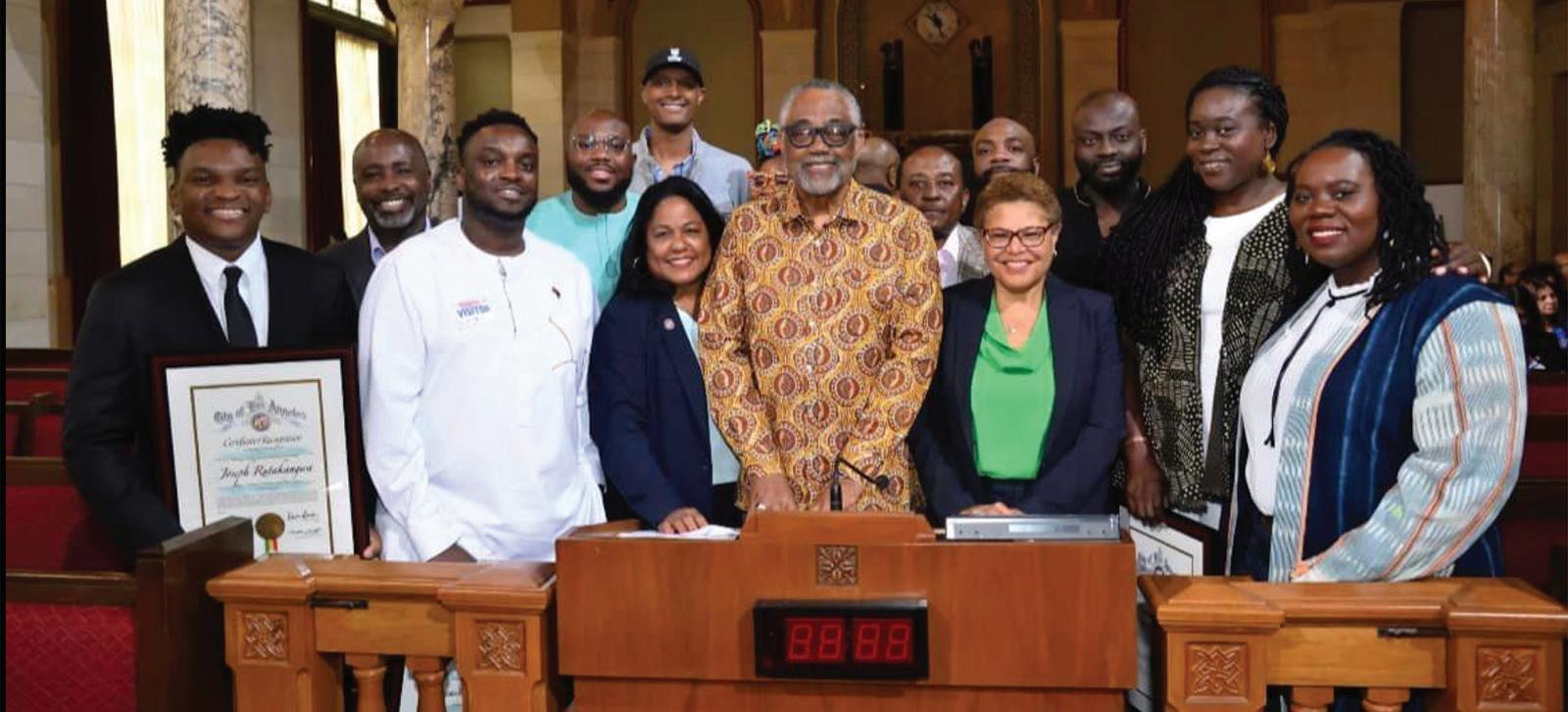
Founded in 1963, the union was established to promote solidarity among African countries, defending their sovereignty, eliminating colonialism, encouraging international cooperation, and coordinating and harmonizing member states’ policies.
Councilman Curren Price led the event’s main presentation, where the history of the union was shared along with the acknowledgment of LA-based entrepreneurs who promote African culture and influence and make it part of their mission to give back to Africa and the city.
“As we know, Africans have been displaced throughout the globe, and many of us are descendants who may or may not be able to trace our heritage, but that does not hinder us from honoring the continent and the African diaspora,” Price said. Bass highlighted that at the time the union was formed, only 30 African countries were independent. Today, 54 countries have
that distinction.
“There was a large movement in the United States, celebrating the independence of nations, but also some fighting to change U.S. policy,” Bass said. “I think, it’s most famously known as the anti-apartheid movement.”
Bass said the City Council played an important role during that time to divest from doing any business related to South Africa. Councilman Robert Farrell, and Rep. Maxine Waters (DCA 43) who was then an Assemblymember in 1976, played key roles in this effort.
“This movement caught fire around the country and around the world,” Bass said. “It actually led to one of the many reasons why the U.S. changed its policy and decided to divest and impose sanctions on South Africa.”
State Lawmakers Call for Transit Bailout
On June 3, Sen. Scott Wiener (D-San Francisco), along with other lawmakers, held a press conference outside of the California Environmental Protection Agency to call for additional state funding to support public transportation.
Gov. Newsom recently presented the legislature with his plan to close California’s $31.5 billion-dollar deficit. In the proposal, Newsom did not include critical funding that public transit in the state requires to avoid a deficit.
“Our transit systems have been telling us for months and months and months that this fiscal cliff is happening, and unfortunately the governor’s budget had zero dollars in it to address these operational shortfalls — zero!” Sen. Wiener told reporters.“Instead, the governor’s proposal slashes $2 billion in transit infrastructure money, which will kill various projects around the state and will cause us to forfeit billions of federal matching dollars if we’re taking away our own capital investment,” Wiener added.
Assemblymember Buffy Wicks (D-Oakland) said transportation is facing cuts across the country, but funding for California’s transit infrastructure is not negotiable.
“It’s time for the state of California to intervene and ensure we don’t step off a transportation fiscal cliff from which we cannot recover.”
The lawmakers want the governor to restore a $2 billion
cut from transit infrastructure and to add operational funding to avoid services cuts. Without state funding, BART says it will have to run trains only once an hour, cut service on weekends and after 9 p.m. on weeknights, reduce service to San Francisco International and Oakland International airports, close some stations and even shut down some lines.
Large Number of Voters Still Undecided in California Senatorial Race
Last week, calls from state leaders and the public urging California Sen. Dianne Feinstein to resign grew louder. But there is still a large number of voters undecided about who they would like to replace her.
In a recent poll conducted by the UC Berkley Institute of Governmental Studies, 4 out of 10 voters do not know who they will vote for in the 2024 senate race.
The candidates to replace Senator Feinstein include Democrats, Reps. Katie Porter (D-CA-47), Adam B. Schiff (DCA-30) and Barbara Lee (D-CA_12) and Republican attorney Eric Early.
According to the poll, Early and Porter are in the lead with 18% and 17% of the vote, respectively. Schiff (14%) and Lee (9%) are falling behind with 42% of likely voters still undecided.
The top two finishers in the March 2024 primary will face off in the general election.
Lee, the only announced Black candidate, received a vote of favorability with 26% of likely voters in the poll, 19% unfavorable and 55% saying they had no opinion. Among Black voters, 45% said they had no opinion of Lee.
Lee is known for being the sole vote against giving President George W. Bush broad war powers after 9/11. In the California Legislature, she wrote the California Violence Against Women Act and a bill enhancing penalties for blocking access to abortion clinics.
“We’re not looking back on this campaign,” Lee said. “But I want you to look at what I have done as a progressive Black woman, both in the Legislature and in Congress, to know that I’m going to stand my ground. I have convictions and courage. And it’s an indicator of what I will do in the future.”
Gov. Newsom Grants Pardons to Four Veterans
Last week, Gov. Newsom granted pardons to four people
who served in the Armed Services. The California Constitution gives the Governor authority to grant executive clemency, recognizing an individual’s efforts towards self-rehabilitation and accountability.
Jamar Baines served in the U.S. Marine Corps, and was discharged under honorable conditions, with a National Defense Service medal and Humanitarian Service medal.
Andres De Leon is a Vietnam War veteran. In 1967, 19-yearold De Leon was convicted of burglary, then enlisted in the Army shortly after serving his sentence. He was honorably discharged.
Fabian Rebolledo is a U.S. Army veteran who served as a paratrooper and a peacekeeper during combat operations in Kosovo and received an honorable discharge in 2000.
Ernest Sari served in the U.S. Army National Guard and was honorably discharged. In 2001, he was convicted of possession of a controlled substance while armed with a firearm.
Gov. Newsom has granted a total of 144 pardons, 123 commutations, and 36 reprieves.
Senate Advances Bills Protecting Foster and Homeless Youths
Last week, the California State Senate passed two bills introduced by Sen. Dave Cortese (D-San Jose) that will protect children facing adversity.
Senate Bill (SB) 333, guarantees income to homeless high school seniors. Senate Bill (SB) 9 raises the age from 21 to 22 for young people to stay in extended foster care.
SB 333 will provide stipends of $1,000 a month for five months to unhoused students finishing high school “to help them enroll in college or enter the workforce.”
“I applaud my Senate colleagues for protecting California’s most vulnerable students during a crucial time. High schools offer homeless students a support network that can include free counseling, school supplies, transportation and meals,” Cortese said.
On May 30, the Senate passed SB 9 with a 40-to-0 vote. It now heads to the Assembly for consideration.
On May 22, the Senate passed SB 333 with a 34-to-4-vote. It is now being reviewed by the Assembly Education and Human Services committees.
Joint Center Study Finds that Black Americans Have Widely Varied Views of Financial Situations
 By Stacy M. Brown NNPA Newswire Senior National Correspondent
By Stacy M. Brown NNPA Newswire Senior National Correspondent
The Joint Center for Political and Economic Studies, a Washington, D.C., think tank, has found that Black Americans are not seeing their finances improve in America’s current recovery.
The Joint Center’s latest report, “Pessimism and Hope: A Survey of the Financial Status and Aspirations of Black Americans,” found that more than half of Black Americans (57 percent) have credit card debt, about a third (32 percent) have student loan debt, and over a quarter (28 percent) have mortgage debt.
Further, about one-third (33 percent) of Black Americans report having more debt than is manageable. The 39-page report noted that Black Americans have a wide range of credit scores. Approximately three in 10 Black Americans (30 percent) report having a credit score that is good or very good, and around four in 10 (39 percent) report having a credit score that is bad or very bad.
Also, credit scores vary substantially with income, with nearly half of Black Americans who make $60,000 or more annually reported having a good or very good credit score; only 16 percent of Black Americans who make $30,000 or less per year report having good or very good credit scores.
Joint Center officials said the full report, which examines Black Americans’ financial conditions and ambitions, contains research completed in partnership with NORC at the University of Chicago.
Officials said researchers took a community-centered approach to understand the current financial situations, debt and credit, financial aspirations, and perceived barriers for Black Americans.
“This research is especially timely as Black Americans work to realize the full benefits of the current economic recovery,” Jessica Fulton, vice president of policy for the Joint Center, stated in a news release.
“By collecting and analyzing new data on Black Americans
specifically, we gain insights into the economic well-being of Black communities — and, therefore, the combined national economy — in the wake of the COVID-19 pandemic,” Fulton said.
“Our findings will serve public and private sector decisionmakers committed to connecting more Americans to economic opportunities, especially those focused on financial well-being and wealth building.”
Among the report’s highlights, respondents identified medical costs as a significant barrier to proper medical care for some Black Americans.
For example, around one-quarter of Black Americans have skipped a medical test or treatment (22 percent), failed to fill a prescription (23 percent), or failed to get medical care for a condition (24 percent) because of cost.
Researchers concluded that most Black Americans’ financial aspirations revolve around relatively immediate goals, with 80 percent of Black adults viewing things like not having to worry about monthly bills, not living paycheck to paycheck, having enough savings to handle an emergency, and being debt-free as very important to their financial goals.
With the battle continuing in Congress over the nation’s debt ceiling, about 38 percent of Black Americans are mainly concerned with the possibility of reducing social security payments, which researchers determined poses a significant risk for many people’s retirement security.
Republican members of Congress have signaled a desire to cut social security benefits. At the same time, Vice President Kamala Harris told the Black Press that such an occurrence was “a non-starter” for Democrats in recent negotiations.
The Joint Center also found that the most frequently cited barriers to achieving financial aspirations are related to the current economy. High inflation, insufficient money to start investing, and high-interest rates were the most cited barriers in the study.
The phenomenon of Black Americans being harder hit by
adverse economic influences and lagging in recovery compared to white Americans is not new, the report’s authors stated.
They asserted disparate economic impacts for Black communities are also apparent in the current crisis.
Research from the current crisis shows the outsized impacts on Black communities. “Based on past and ongoing work to expose disparities and promote equity, we know that structural barriers faced by Black
Americans — the compounded insults of health and economic consequences of COVID-19, the economic assault from the Great Recession, and persistent structural racism — are destructive to the financial well-being of Black households,” the authors noted.
“However, despite some distressing indicators about their current financial situation, most Black Americans are optimistic about their financial future, even at lower-income levels.”
New Children’s Book Teaches Young Ones About Juneteenth
By Stacy M. Brown NNPA Newswire Senior National Correspondent Lavaille Lavette, aNew York Times best-selling author, said her greatest satisfaction is telling stories about people, places, things, and events that everyone should remember.
“Jayylen’s Juneteenth Surprise,” her most recent work, is a gorgeously illustrated “Little Golden Book” about a little boy’s first Juneteenth celebration.

The book aims to teach young readers about Juneteenth, a national holiday honoring the abolition of slavery in the United States.
“I wrote this book in the way that I imagine learning about Juneteenth for the first time as a child growing up in Louisiana,” Lavette stated in a news release.
“It is important to keep the story of Juneteenth alive because it helps us remember the past while improving the present we live in as we build the future we seek.
Lavette, who holds a bachelor’s degree in mathematics and accounting and a master’s degree in education management, has worked as both a teacher and a school administrator.
She has worked as a special advisor to the United States Secretary of Education and the president, publisher, and managing partner of One Street Books, Lavette Books, and Ebony Media Publishing LLC.

Lavette said an early pandemic conversation with her mother inspired Jayylen’s Juneteenth Surprise.
“My mom told me that she grew up celebrating Juneteenth. Juneteenth was a big deal, doing her childhood, with fanfare that included zydeco music, two-step dancing, all types of food and treats, and fellowship with friends and family,” Lavette recalled.
“The tradition was spearheaded by my mother’s father,
and when he died the tradition ended. I must admit that during my childhood, we did not talk about Juneteenth. I knew very little about it growing up.”
She stated that she didn’t realize the Juneteenth celebrations and traditions until she went to Houston as an adult and elementary school teacher.
In Texas, elected leaders celebrated Juneteenth in schools and churches, and many African American business owners observed the day by closing their doors.
“Now, that was something special,” Lavette recalled.
She has pledged some of the proceeds from Jayylen’s Juneteenth Surprise sales to the National Urban League’s youth programs.
Lavette characterized herself as an enthusiastic supporter of the National Urban League and its goals and expressed her desire to assist the organization in continuing to inspire young minds and effect lasting change.
Jayylen.com offers a free “Jayylen’s Juneteenth Surprise” Teacher’s Resource Guide and Parent Guide to supplement the educational experience.

“Children’s books are not just for children,” stressed Lavelle.
“I’m very intentional in introducing Jayylen as a Little Golden Book because Little Golden Books they’re 24 pages, usually between 700 and 1,000 words.
“That means you have to be very concise. You have to get a lot of information without a lot of words. So, you have to be very descriptive in how you present the stories. It makes it very entertaining and interesting for kids, but also for adults.”
Lavelle said she’d had a lot of positive feedback on her Juneteenth book and other children’s biographies.
“Because a 1- or 2-year-old is not reading, that means
the parent is going to read the book to the child,” Lavette concluded.
“So, the parent is going to learn something, as well.
And that age group, I love that (age) 0 to 6 because it allows me to disseminate information, not only to the kid but also to the parent.”
The book aims to teach young readers about Juneteenth, a national holiday honoring the abolition of slavery in the United States.
Judge Dismisses Criminal Charges Against California Energy Company in 2020 Fatal Wildfire
REDDING, Calif. (AP) - A California judge on Wednesday dismissed all charges against Pacific Gas & Electric in connection to a 2020 fatal wildfire sparked by its equipment that destroyed hundreds of homes and killed four people, including an 8-year-old.
The utility also reached a $50 million settlement agreement with the Shasta County District Attorney's Office, officials from both announced in separate
statements.
The wind-whipped blaze began on Sept. 27, 2020, and raged through rugged terrain and small communities west of Redding, killing four people, burning about 200 homes and blackening about 87 square miles (225 square kilometers) of land in Shasta and Tehama counties.
In 2021, state fire investigators concluded the fire was sparked by a gray pine tree that fell onto a PG&E
distribution line. Shasta and Tehama counties sued the utility, alleging negligence. They said PG&E failed to remove the tree even though it had been marked for removal two years earlier. The utility says the tree was subsequently cleared to stay.
Shasta County District Attorney Stephanie Bridgett determined that the company was criminally liable for the fire and charged the utility later that year.
Shasta Superior Court Judge Daniel E. Flynn disagreed, and in a tentative ruling ahead of a hearing Wednesday said prosecutors did not present enough evidence to show PG&E engaged in criminal conduct, according to the Sacramento Bee, which obtained a copy of the ruling.
The "tree was not a known risk prior to the Zogg fire, and there is no evidence to support the People's claim in their opposition that it was,'' the judge wrote.
The utility said in a statement that under the agreement with Shasta County, which is subject to court approval, it will fund $45 million in contributions to organizations dedicated to rebuilding and assisting local communities.

The company will also pay a $5 million civil penalty to the county. "We stand behind our thousands of trained and
experienced coworkers and contractors working every day to keep Californians safe. We feel strongly that those goodfaith judgments are not criminal," said Patti Poppe, Chief Executive Officer of PG&E Corporation.
Bridgett said her goal was always to take PG&E to trial and hold them criminally responsible but that Flynn's tentative ruling changed her position and she agreed to a settlement that includes dropping all charges.
"I am unwilling to gamble with the safety of Shasta County," she said. ''I have a responsibility to the community and needed to secure what I can for all the citizens to prevent future wildfires, prevent future deaths and devastation, and to be as prepared as our county can be if another one occurs."
Last week, the California Public Utilities Commission approved a $150 million settlement between Pacific Gas and Electric Co. and the CPUC's Safety and Enforcement Division over PG&E's role in the Zogg Fire. As part of the agreement, the utility will pay $10 million as a penalty to California's General Fund, and invest $140 million in shareholder funds in new wildfire mitigation efforts, officials said.
Protecting lives on the road during National Safety Month and beyond
Consequences of Distracted Driving and Speeding Disproportionately Impact Black Lives
ELK GROVE, Calif. —June marks the beginning of summer and the observance of National Safety Month.
The California Office of Traffic Safety (OTS) and Caltrans are calling on all drivers to prioritize safety and help raise awareness about current dangerous driving behavior and its disproportionate impact on Black communities in California and across the U.S.

According to the latest projections from the National Highway Traffic Safety Administration (NHTSA), more than 4,400 people were killed in traffic crashes in California in 2022, or 12 people every day. A disproportionate number of those deaths affect Black communities and people walking and cycling. People outside of vehicles do not have the same protections as people riding inside vehicles.
A recent study published by the American Journal of Preventive Medicine found that, on a national level, Black people experience a passenger vehicle fatality rate 73% higher than their white counterparts, with the highest overall traffic fatality rate per mile traveled and across all modes of transportation, including walking, cycling and driving. In California, Black pedestrians have a 65% higher fatality rate compared to white pedestrians.
In an era where screens dominate our attention, distractions behind the wheel have become an alarming issue. Using a phone to dial, talk or text doubles the risk of a driver getting into a crash. Sending or receiving a text message takes a driver’s eyes off the road for an average of 4.6 seconds. In 2020, 3,142 Americans were killed in crashes involving distracted drivers.
Other dangerous driving behaviors like speeding have also become increasingly normalized. Whether it involves exceeding the posted speed limit, driving too fast for conditions or racing, speeding was a factor in 29% of all national traffic fatalities in 2021. In California, 1,509 people were killed in speeding-related crashes in 2021.
To address the dangers of distracted driving, speeding and the disproportionate impacts each dangerous behavior has on Black lives, the OTS and Caltrans launched a callto-action campaign that aims to establish a strong safety
culture in California. You can join the Go Safely Movement and become a traffic safety champion by taking a short Community Call to Action survey to share what issues you are experiencing in your everyday travels. Your answers will assist the OTS and Caltrans in strengthening connections with communities, providing access to resources, and promoting traffic safety across transportation systems.
The OTS and Caltrans encourages everyone to prioritize safety by reminding drivers to practice the following behaviors:
California has a hands-free cell phone law, which prohibits drivers from holding a phone or other electronic device while behind the wheel.
Drivers under the age of 18 may not use any mobile communications device at all, whether hands-free or handheld. If you need to make a call or send a text, pull over and park at a safe location.
Be Work Zone Alert. When you see flashing amber lights ahead and you’re approaching a work zone, slow down and Move Over a lane if it is safe to do so. It’s the law.
Avoid the temptation of using the phone while driving altogether. Put the phone in the glove box, trunk, or back seat; anywhere you cannot reach.
Remember, there are other distractions: eating, grooming, reaching for something that fell on the floor, putting on or taking off clothing, deep conversations with passengers, or fussy children in the back seat. If you find yourself in any of these situations, find a quiet, safe place to park and address the distraction.
Know and respect the speed limit. It’s not worth pushing the envelope to save a minute or two.
Be aware of your surroundings: Look out for pedestrians, cyclists, and obstructions in the road, especially in hard-to-see conditions such as at night or in bad weather.
Let’s work together to create safer roadways this National Safety Month and beyond. To learn more about the Go Safely Movement, visit gosafelyca.org/ thegosafelymovement, and follow Go Safely on Facebook, Twitter, and Instagram @OTS_CA and @GoSafelyCA.


